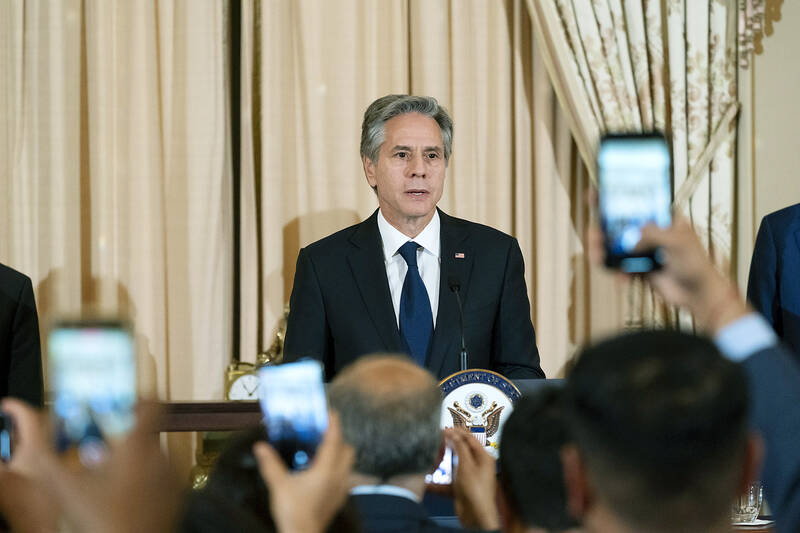US Secretary of State Antony Blinken on Wednesday accused China of undermining a decades-old “status quo” that has kept Washington and Beijing from going to war over Taiwan, saying China was trying to “speed up” its seizure of the nation.
“What’s changed is this — a decision by the government in Beijing that that status quo was no longer acceptable, that they wanted to speed up the process by which they would pursue reunification,” Blinken said in an interview at Bloomberg’s offices in Washington.
“They also, I think, made decisions about how they would do that, including exerting more pressure on Taiwan, coercion — making life difficult in a variety of ways on Taiwan in the hopes that that would speed reunification,” he said.

Photo: AP
The latest comments from the top US diplomat rebuking China over Taiwan expand on Blinken’s statements from last week that China might seize Taiwan on a “much faster timeline” than previously thought.
Blinken’s latest criticism, part of a broader war of words between Washington and Beijing, also came shortly after Beijing wrapped up its twice-a-decade Chinese Communist Party congress, which saw Chinese President Xi Jinping (習近平) consolidate his power.
Taiwan remains the key flash point and the most likely source of conflict between the US and China. Tensions over the nation spiked dramatically when US House of Representatives Speaker Nancy Pelosi defied Beijing’s warnings and visited Taipei in August.
Blinken said the US and China were now clearly engaged in a global competition to shape international affairs, with Beijing pushing back against the US to champion an “illiberal” world order.
“We don’t look for conflict. We don’t want a cold war. We’re not trying to contain or restrain China,” Blinken said. “But equally, we’re resolute in standing up for our interests, standing up for our values. And again, when it comes to Taiwan, standing up for the proposition that’s held for decades, that these differences need to be managed and resolved peacefully.”
In Taipei, Ministry of Foreign Affairs (MOFA) spokeswoman Joanne Ou (歐江安) slammed China for conducting military drills in Taiwan’s airspace and waters around the nation since August, saying that the drills raised cross-strait tensions without any provocation.
The US government has issued multiple joint statements with like-minded countries to show its concern for peace and stability in the Taiwan Strait, she said, adding that Taiwan is to continue strengthening its self-defense capabilities, the security partnership with the US, and cooperation with Japan and other like-minded partners to defend the country’s sovereignty, democratic way of life, peace and an international order based on shared values.
Mainland Affairs Council Deputy Minister Chiu Chui-cheng (邱垂正) said the government is “steadfast in the defense of national sovereignty, freedom and democracy without any room for compromise.”
The government insists on a free and democratic constitutional order, a mutually non-subordinate relationship with China, sovereignty and determining the future of the country with Taiwanese representing the social consensus in the nation, he said, adding that there can be no compromises on the four issues.
Additional reporting by Chen Yu-fu

CHAOS: Iranians took to the streets playing celebratory music after reports of Khamenei’s death on Saturday, while mourners also gathered in Tehran yesterday Iranian Supreme Leader Ayatollah Ali Khamenei was killed in a major attack on Iran launched by Israel and the US, throwing the future of the Islamic republic into doubt and raising the risk of regional instability. Iranian state television and the state-run IRNA news agency announced the 86-year-old’s death early yesterday. US President Donald Trump said it gave Iranians their “greatest chance” to “take back” their country. The announcements came after a joint US and Israeli aerial bombardment that targeted Iranian military and governmental sites. Trump said the “heavy and pinpoint bombing” would continue through the week or as long

TRUST: The KMT said it respected the US’ timing and considerations, and hoped it would continue to honor its commitments to helping Taiwan bolster its defenses and deterrence US President Donald Trump is delaying a multibillion-dollar arms sale to Taiwan to ensure his visit to Beijing is successful, a New York Times report said. The weapons sales package has stalled in the US Department of State, the report said, citing US officials it did not identify. The White House has told agencies not to push forward ahead of Trump’s meeting with Chinese President Xi Jinping (習近平), it said. The two last month held a phone call to discuss trade and geopolitical flashpoints ahead of the summit. Xi raised the Taiwan issue and urged the US to handle arms sales to

BIG SPENDERS: Foreign investors bought the most Taiwan equities since 2005, signaling confidence that an AI boom would continue to benefit chipmakers Taiwan Semiconductor Manufacturing Co’s (TSMC, 台積電) market capitalization swelled to US$2 trillion for the first time following a 4.25 percent rally in its American depositary receipts (ADR) overnight, putting the world’s biggest contract chipmaker sixth on the list of the world’s biggest companies by market capitalization, just behind Amazon.com Inc. The site CompaniesMarketcap.com ranked TSMC ahead of Saudi Aramco and Meta Platforms Inc. The Taiwanese company’s ADRs on Tuesday surged to US$385.75 on the New York Stock Exchange, as strong demand for artificial intelligence (AI) applications led to chip supply constraints and boost revenue growth to record-breaking levels. Each TSMC ADR represents

State-run CPC Corp, Taiwan (CPC, 台灣中油) yesterday said that it had confirmed on Saturday night with its liquefied natural gas (LNG) and crude oil suppliers that shipments are proceeding as scheduled and that domestic supplies remain unaffected. The CPC yesterday announced the gasoline and diesel prices will rise by NT$0.2 and NT$0.4 per liter, respectively, starting Monday, citing Middle East tensions and blizzards in the eastern United States. CPC also iterated it has been reducing the proportion of crude oil imports from the Middle East and diversifying its supply sources in the past few years in response to geopolitical risks, expanding